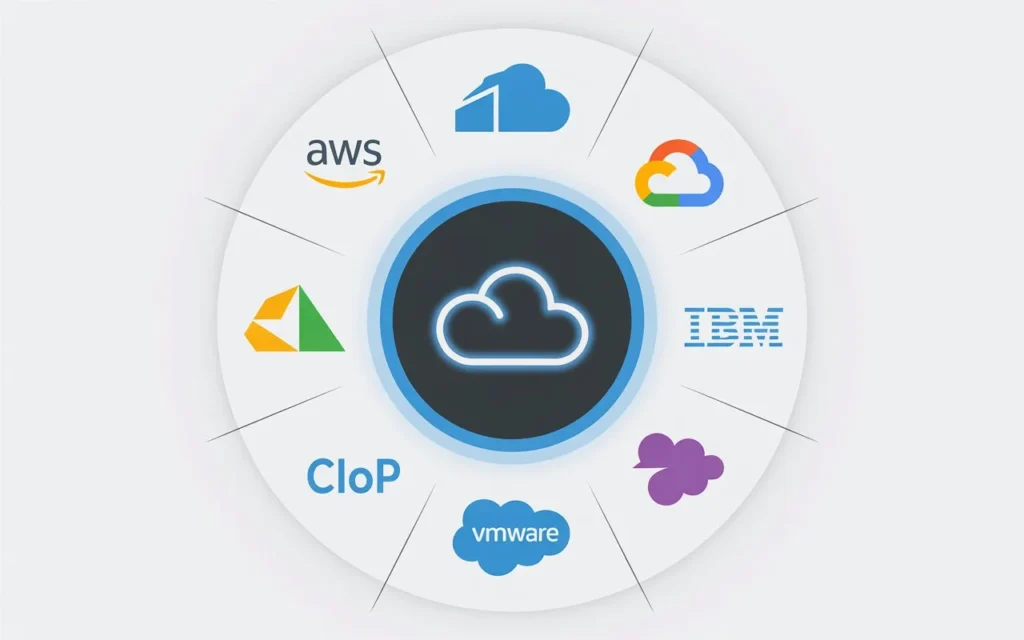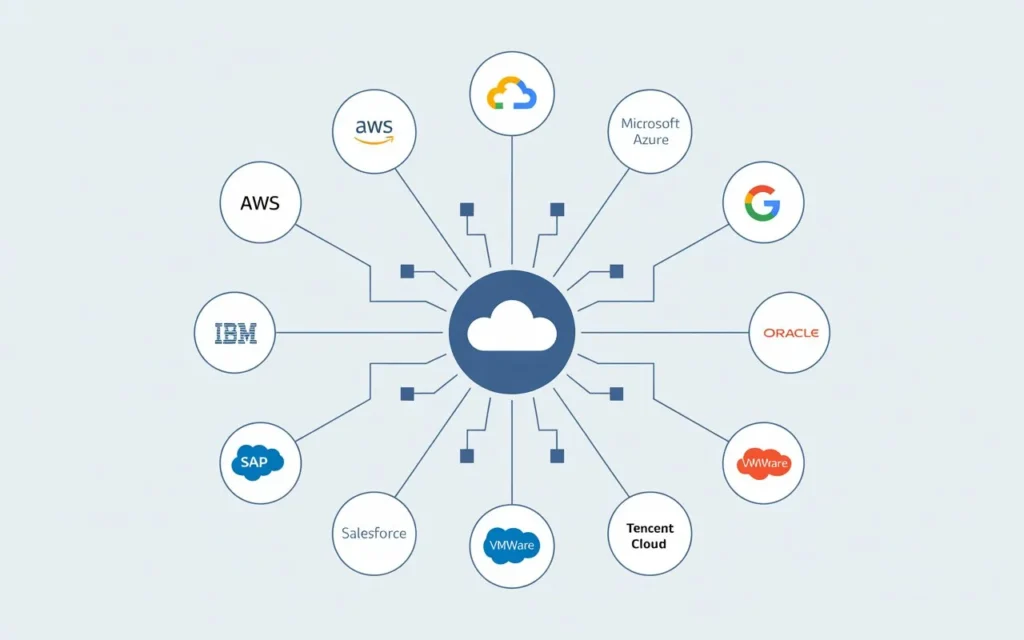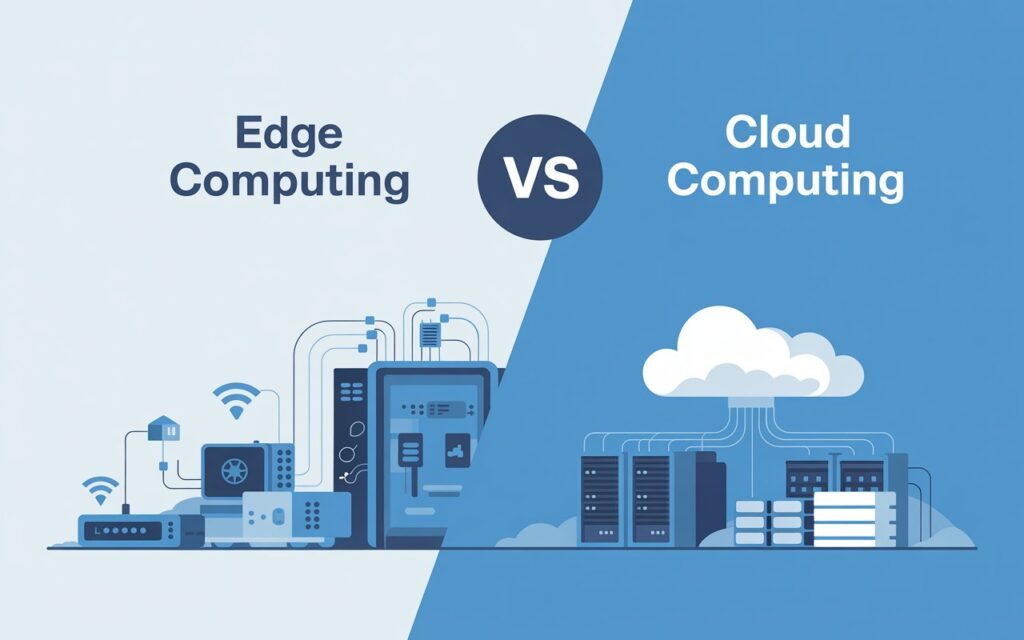Top 10 Cloud Service Providers Businesses Rely On
Cloud computing has become the backbone of modern business. From small startups to multinational enterprises, organizations are shifting to the cloud to gain flexibility, reduce costs, and strengthen security. But with so many providers in the market, selecting the right one can be a challenge.
This article highlights the top 10 cloud service providers in dubai shaping today’s digital economy, including their global impact and relevance for businesses in Dubai and across the UAE. By the end, you’ll also understand why use cloud services as a fundamental part of your business strategy.

AWS remains the global leader in cloud computing, offering a wide range of solutions for computing, storage, machine learning, and analytics. Businesses appreciate its scalability and global infrastructure, making it a preferred choice for enterprises in diverse industries.
2. Microsoft Azure
Azure is one of the fastest-growing cloud platforms, widely used for hybrid cloud models. Its strong integration with Microsoft 365 and enterprise applications makes it highly attractive for businesses in Dubai already using Microsoft products.
3. Google Cloud Platform (GCP)
Known for innovation, GCP excels in data analytics, AI, and machine learning services. Companies that rely heavily on advanced analytics often turn to Google Cloud for its competitive edge in processing large-scale data
4. IBM Cloud
5. Oracle Cloud Infrastructure (OCI)
Oracle Cloud is a strong contender in enterprise environments where databases play a central role. Its cloud infrastructure offers powerful performance for ERP systems, making it popular among large corporations.
6. Alibaba Cloud
As the leading cloud service provider in Asia, Alibaba Cloud is expanding globally. For businesses in Dubai with ties to Asian markets, it offers great solutions for e-commerce, logistics, and cross-border operations.
7. SAP Cloud
8. Salesforce Cloud
Focused primarily on customer relationship management (CRM), Salesforce Cloud enables businesses to manage sales, marketing, and customer engagement. Its platform is widely used across industries that prioritize customer experience.
9. VMware Cloud
VMware Cloud offers solutions for virtualization and hybrid environments, helping companies modernize IT infrastructure while maintaining existing systems. It is especially valued by businesses transitioning gradually to the cloud.
10. Tencent Cloud
Although newer to global markets, Tencent Cloud is growing quickly and providing strong competition, especially for businesses seeking gaming, AI, and real-time communication capabilities.

Why Use Cloud Services for Your Business?
With the top 10 cloud service providers Dubai businesses have access to, the bigger question is not “if” but “why.” Here are the key advantages cloud brings to organizations:
- Scalability: Grow or shrink IT resources based on demand without major upfront costs.
- Cost Efficiency: Pay only for what you use, avoiding heavy investments in hardware.
- Business Continuity: Cloud-based backups and disaster recovery keep operations running during crises.
- Security: Leading cloud providers invest heavily in cybersecurity, ensuring data protection.
- Collaboration: Cloud platforms make it easier for teams to work together, regardless of location.
In Dubai, where digital transformation is at the center of business growth, these benefits are even more critical. Companies leveraging the right cloud provider are not just improving IT they are building a foundation for long-term competitiveness. The choice between the top 10 cloud service providers depends on your business goals, existing IT setup, and regulatory needs. Whether it’s AWS for scalability, Microsoft Azure for integration, or Google Cloud for analytics, the right decision can shape your organization’s digital future. For businesses in Dubai and the wider UAE, cloud adoption is no longer optional but it’s a strategic move to stay competitive in fast-changing markets.
Frequently Asked Questions (FAQs)
- Who are the top 10 cloud service providers in 2025?
The top 10 cloud service providers include Amazon Web Services (AWS), Microsoft Azure, Google Cloud Platform (GCP), IBM Cloud, Oracle Cloud Infrastructure (OCI), Alibaba Cloud, SAP Cloud, Salesforce Cloud, VMware Cloud, and Tencent Cloud. Each offers different strengths such as scalability, analytics, compliance, and enterprise integration.
- Why use cloud services for my business in Dubai?
Cloud services allow Dubai-based businesses to scale resources on demand, improve collaboration, reduce IT costs, and secure critical data. They also ensure compliance with regional data regulations, which is vital for sectors like finance, healthcare, and government.
- What is the difference between cloud providers?
The difference between cloud providers lies in their core strengths. For example, AWS leads in global scale, Azure is favored for enterprise integration, Google Cloud excels in AI and analytics, and Oracle Cloud is designed for database-driven applications. Businesses should select based on their strategic goals.
- Which cloud service provider is best for small businesses?
For small businesses, providers like Microsoft Azure and Google Cloud are often more suitable due to flexible pricing models, user-friendly platforms, and integration with everyday tools. However, the best option depends on the business’s industry, budget, and growth plans.
- Can a business use more than one cloud service provider?
Yes. Many companies adopt a multi-cloud strategy, combining services from different providers to balance performance, cost, and security. For example, an organization may use AWS for scalability, Azure for productivity tools, and Google Cloud for advanced analytics.


